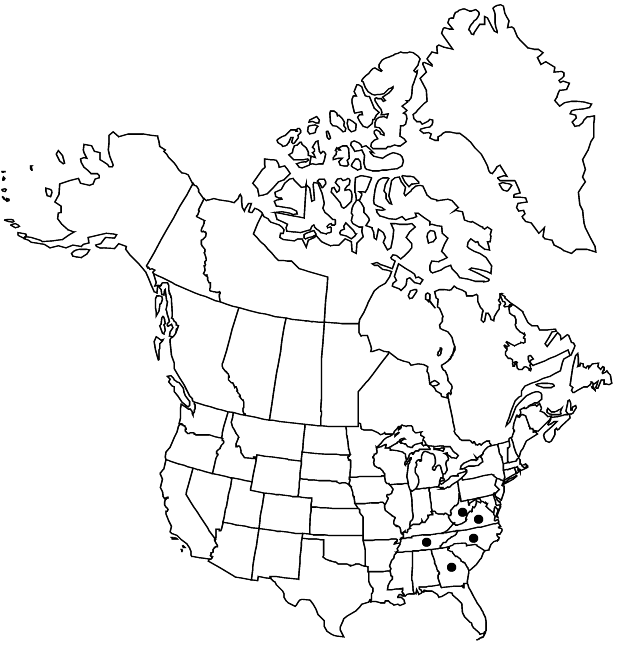Difference between revisions of "Pieris floribunda"
Gen. Pl. 2: 588. 1876 ,.
FNA>Volume Importer |
FNA>Volume Importer |
||
| Line 29: | Line 29: | ||
|elevation=500-1800 m | |elevation=500-1800 m | ||
|distribution=Ga.;N.C.;Tenn.;Va.;W.Va. | |distribution=Ga.;N.C.;Tenn.;Va.;W.Va. | ||
| − | |discussion=<p>Individuals of Pieris floribunda are beautiful, cold-hardy shrubs and are frequently cultivated as ornamentals. The species is sometimes confused with the eastern Asian P. japonica D. Don ex G. Don and P. formosa D. Don. Pieris japonica is commonly cultivated and may be distinguished from P. floribunda by its lack of stiff, multicellular, elongate hairs on stems and leaf margins, and pseudoverticillate leaves with margins nearly entire to clearly toothed.</p> | + | |discussion=<p>Individuals of <i>Pieris floribunda</i> are beautiful, cold-hardy shrubs and are frequently cultivated as ornamentals. The species is sometimes confused with the eastern Asian <i>P. japonica</i> D. Don ex G. Don and P. formosa D. Don. <i>Pieris</i> japonica is commonly cultivated and may be distinguished from <i>P. floribunda</i> by its lack of stiff, multicellular, elongate hairs on stems and leaf margins, and pseudoverticillate leaves with margins nearly entire to clearly toothed.</p> |
|tables= | |tables= | ||
|references= | |references= | ||
| Line 53: | Line 53: | ||
|publication year= | |publication year= | ||
|special status= | |special status= | ||
| − | |source xml=https://jpend@bitbucket.org/aafc-mbb/fna-data-curation.git/src/ | + | |source xml=https://jpend@bitbucket.org/aafc-mbb/fna-data-curation.git/src/8f726806613d60c220dc4493de13607dd3150896/coarse_grained_fna_xml/V8/V8_973.xml |
|subfamily=Ericaceae subfam. Vaccinioideae | |subfamily=Ericaceae subfam. Vaccinioideae | ||
|genus=Pieris | |genus=Pieris | ||
Revision as of 19:10, 18 September 2019
Shrubs, to 2 m, with ± erect branches; twigs multicellular stipitate-glandular-hairy and conspicuously strigose (hairs elongate, stiff, long-celled, eglandular), otherwise sparsely to densely unicellular-hairy. Stems terete to slightly angled. Leaf blades elliptic to ovate, (1.5–)3–7.2 × (0.6–)1–2.8 cm, base rounded to widely cuneate, margins serrulate (each tooth associated with elongate hair), plane, apex acute. Inflorescences terminal panicles, sometimes with proximalmost lateral branches arising from axils of distalmost leaves; bracteoles near or slightly proximal to middle of pedicel. Flowers: calyx lobes 2–4 × 1–1.7 mm; corolla urceolate, strongly 5-ridged, 4–7 × 3–5.5 mm; filaments straight, 2–3 mm, hairy; style slightly sunken into ovary apex. Capsules subglobose or globose to ovoid, 4–6 × 4–6 mm, glabrous; placentae subapical. Seeds ellipsoidal to ± rectangular and flattened, with 2 inconspicuous wings; testa cells elongate. 2n = 24.
Phenology: Flowering early spring–spring.
Habitat: Montane thickets and balds, oak, pine, and/or hemlock forests
Elevation: 500-1800 m
Distribution

Ga., N.C., Tenn., Va., W.Va.
Discussion
Individuals of Pieris floribunda are beautiful, cold-hardy shrubs and are frequently cultivated as ornamentals. The species is sometimes confused with the eastern Asian P. japonica D. Don ex G. Don and P. formosa D. Don. Pieris japonica is commonly cultivated and may be distinguished from P. floribunda by its lack of stiff, multicellular, elongate hairs on stems and leaf margins, and pseudoverticillate leaves with margins nearly entire to clearly toothed.
Selected References
None.